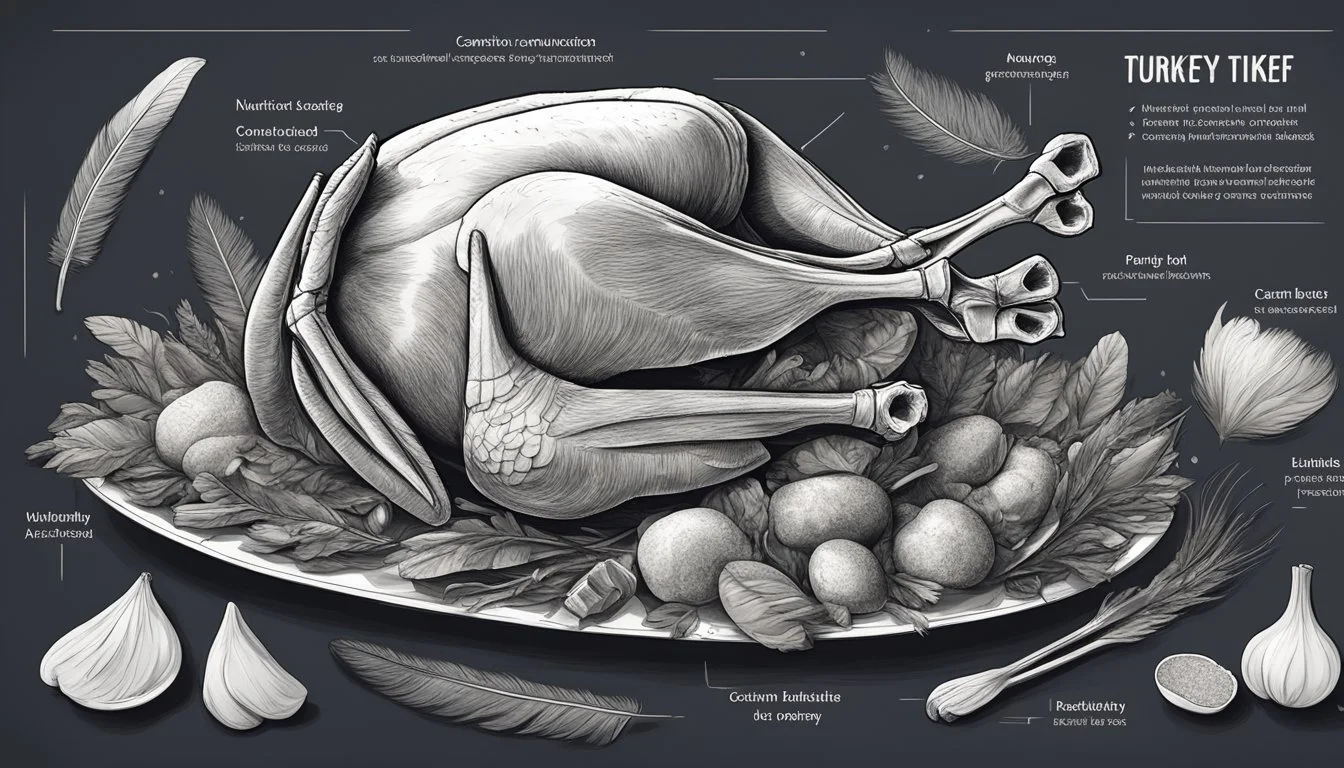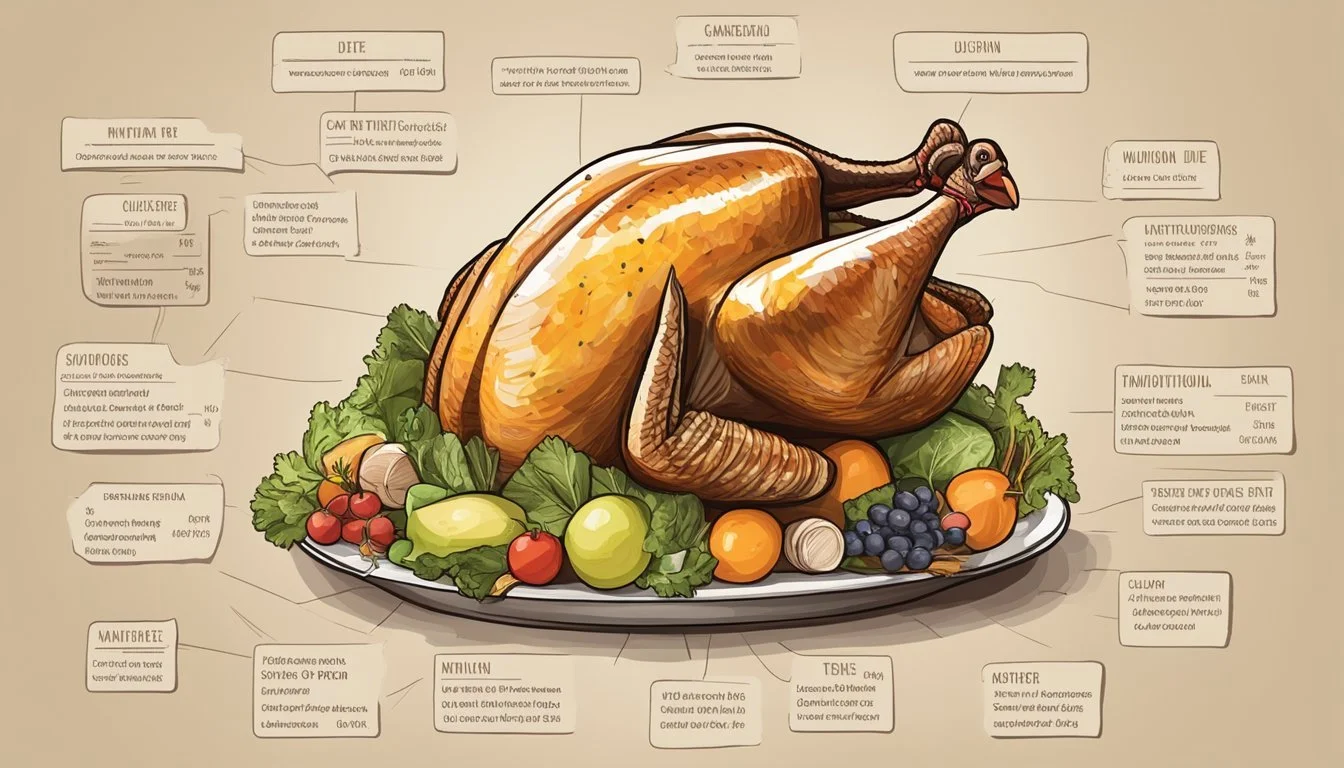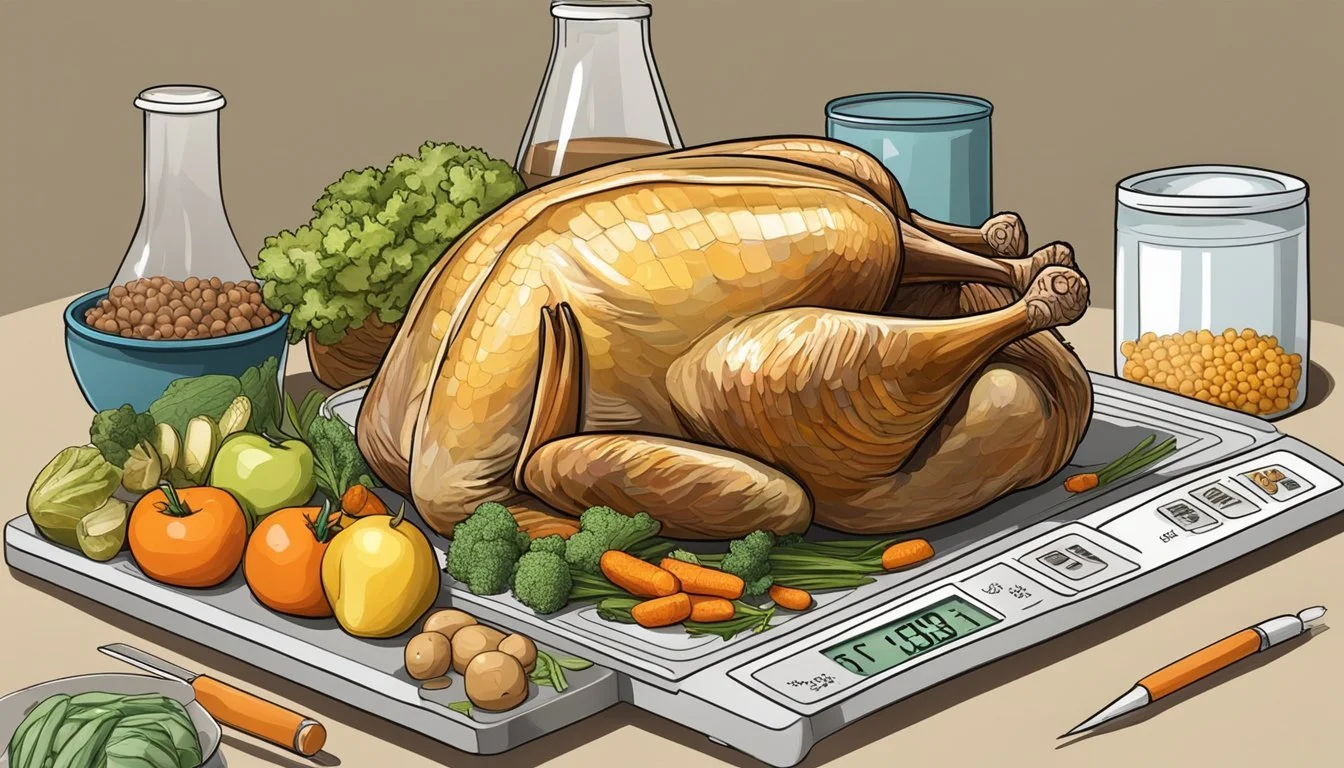Turkey Nutritional Value Carnivore Diet
Key Benefits and Insights
Turkey, often celebrated for its rich flavor and versatility, holds a prominent place in many diets, including the carnivore diet. The consumption of turkey is fully compatible with the carnivore diet, providing a robust source of protein and essential nutrients. This dietary approach embraces all types of animal meats, and turkey legs and wings, which are particularly fattier options, are favored for their nutritional benefits.
Incorporating turkey into a carnivore diet ensures that individuals receive a healthy blend of nutrients without straying from the core principles of this regimen. Turkey offers high-quality proteins, vital for muscle repair and growth, and is rich in vitamins such as B6 and niacin, known for supporting metabolic functions. Additionally, turkey is an excellent source of minerals like zinc and phosphorus, which play crucial roles in immune support and bone health.
For those following a carnivore diet, the addition of turkey not only diversifies the menu but also supports a balanced intake of necessary nutrients. Whether it’s smoked, grilled, or roasted, turkey can seamlessly fit into daily meal planning, providing both variety and nutritional value.
Understanding the Carnivore Diet
The Carnivore Diet focuses exclusively on consuming animal-based foods. It emphasizes high protein and fat intake while completely eliminating plant-based foods, which proponents argue helps achieve better health outcomes.
Origins and Philosophy
The Carnivore Diet traces its roots to ancestral eating patterns, where early humans relied heavily on hunting animals for sustenance. Followers believe modern humans can benefit from similar eating habits.
Advocates argue that this diet is grounded in evolutionary biology, suggesting that high consumption of meat and animal products is in harmony with human biology. This diet usually includes various types of meat, organs, eggs, and sometimes dairy.
Potential Health Benefits
One of the main health claims of the Carnivore Diet includes improved mental clarity. This is attributed to the high intake of fats and proteins, which are thought to support brain function.
Followers also report weight loss, often due to the body's state of ketosis, where it burns fat for energy instead of carbs. Additionally, proponents mention reduced inflammation and better digestive health, as the diet eliminates many foods known to cause gut issues.
Common Criticisms and Challenges
Despite its following, the Carnivore Diet faces significant criticism. Nutritionists argue that it can be overly restrictive, potentially leading to nutrient deficiencies. The lack of fiber from plant-based foods is a major concern, as it is essential for digestive health.
Furthermore, the diet's high fat content may be problematic for individuals with specific health conditions. Critics also point out the limited research supporting long-term health benefits, urging a cautious approach.
Online shopping for fiber supplement is the smart choice for a seamless transaction!
Nutritional Profile of Turkey
Turkey is a staple in many diets due to its rich nutritional value. It offers a high protein content while being relatively low in fat, making it an excellent choice for those on a carnivore diet.
Macro and Micronutrients
Turkey provides an impressive array of nutrients. A typical 100-gram serving of cooked turkey breast contains about 30 grams of protein and just 1-2 grams of fat.
The fat content includes minimal amounts of saturated fat.
Turkey is an excellent source of essential vitamins such as B6 and B12, and minerals like zinc and phosphorus. It also has a moderate level of cholesterol.
Whether roasted, grilled, or broiled, turkey retains its nutritional integrity, providing a good balance of nutrients that support muscle growth and overall health.
Comparison with Other Meat Sources
When compared to other meat sources, turkey stands out due to its lower fat content and high protein levels.
For example, a 100-gram serving of chicken breast contains about 31 grams of protein and 3.6 grams of fat, whereas the same serving of turkey breast contains slightly lower fat.
Beef, while also high in protein, generally has higher fat and saturated fat levels, particularly in cuts like ribeye or ground beef.
Turkey also provides a unique nutritional profile among poultry due to its lighter taste and versatility in cooking, making it a valuable part of a carnivore diet that focuses on animal-based nutrition.
Turkey in the Carnivore Diet
Turkey is a popular choice for those on the carnivore diet due to its nutritional benefits and versatility in various meals. It’s an excellent source of lean protein, making it suitable for anyone looking to maintain or enhance muscle mass and support weight loss.
Incorporating Turkey into Meals and Recipes
Turkey can be seamlessly included in a carnivore meal plan. Options for cuts include turkey breast, thighs, wings, and ground turkey.
Popular preparations:
Grilled turkey breasts: Season with salt and pepper.
Roasted turkey thighs: Cook with favorite herbs and spices.
Ground turkey patties: Ideal for burgers or meatballs.
Adding turkey to meals offers variety and can enhance the nutritional profile of any carnivore recipe, providing leaner alternatives to red meat.
Benefits of Turkey in a High-Protein Diet
Turkey is rich in protein, essential for muscle repair and growth. A 100-gram serving of turkey breast provides approximately 29 grams of protein with minimal fat, making it suitable for those focused on high protein intake without excess calories.
Key Nutrients:
Protein: Supports muscle maintenance and growth.
Vitamins B6 and B12: Aid in energy metabolism.
Niacin: Contributes to overall energy production.
Including turkey in the diet helps meet daily protein requirements efficiently, supports weight management, and offers a good balance of nutrients required for a sustainable and healthy carnivore diet.
Comparative Analysis of Meat Types
When evaluating the carnivore diet, it's crucial to understand the nutritional profiles and benefits that different types of meats offer. This analysis highlights the benefits and downsides of various meats and underscores their roles in nutrient density.
Benefits and Downsides of Other Common Meats
Beef is high in protein and rich in essential vitamins like B12 and minerals such as iron and zinc. It can be fatty or lean depending on the cut, which affects its saturated fat content. Lean cuts like sirloin provide quality protein without excessive fat, while fattier cuts like ribeye offer more flavor.
Lamb offers a high-fat content, especially with cuts like shoulder and leg. It’s rich in vitamin B12, zinc, and selenium. However, lamb has more saturated fat than beef, which can influence heart health if consumed in large amounts.
Pork, particularly cuts like tenderloin, is another great source of protein and B vitamins. Bacon, a popular pork product, is high in sodium and saturated fats, which might be detrimental when consumed excessively, impacting heart disease risk.
Chicken is a lean meat, especially breast meat, high in protein and low in fat. Chicken thighs have more fat but are still lower in saturated fat compared to red meats. Chicken is also a good source of B6 and niacin.
Role of Variety and Nutrient Density
Including seafood and fish like salmon in the carnivore diet introduces omega-3 fatty acids, crucial for heart health. Salmon is also high in vitamin D and protein, offering different nutrient profiles compared to terrestrial meats.
Incorporating organ meats such as liver can significantly boost nutrient intake. Liver is extremely rich in vitamins A, B12, and folate, making it a potent addition for nutrient density.
Eggs provide a balance of protein and fat, along with vital nutrients like choline and vitamin D. They are versatile in meal planning and can complement numerous meat types.
Dairy products can supply calcium and vitamin D, aiding in bone health. Including a variety of meat types alongside dairy ensures a more rounded intake of essential nutrients, reducing the chances of nutrient deficiencies.
Variety in meat consumption ensures not only a broader range of nutrients but also prevents monotony in the diet. Each meat type offers unique benefits, and combining them can enhance the diet's overall nutritional profile.
Dealing with Dietary Restrictions
Individuals on a carnivore diet may face certain dietary restrictions that require careful consideration to maintain a balanced intake of essential nutrients. Addressing nutritional gaps and considering supplementation can help mitigate potential deficiencies.
Addressing Nutritional Gaps
A carnivore diet is highly restrictive, focusing on animal-based products such as meat, dairy, eggs, and seafood, which can lead to concerns about missing out on vital vitamins and minerals. For instance, vitamins such as vitamin C are less prevalent in a meat-centric diet.
Organ meats like beef liver are particularly nutrient-dense and can provide a range of essential vitamins (A, D, and B vitamins) and minerals, which helps bridge some gaps. Fish and other seafood are also valuable for their omega-3 fatty acids and vitamin D.
Maintaining a varied selection of animal products, including different cuts of meat and kinds of seafood, can help ensure a more comprehensive nutritional profile. Incorporating items like bone broth can also contribute to mineral intake, supporting joint and bone health.
Supplementation and Diversification
While the carnivore diet can offer a robust amount of protein, iron, and fat, it might lack certain vitamins and minerals typically found in plant-based foods. Adding supplements, such as vitamin C or multivitamins, may be necessary to prevent deficiencies.
Diversification within the allowed foods is crucial. Supplementing meals with dairy products like milk and cheese can increase calcium and vitamin D intake. Eggs also provide a good mix of essential nutrients, from protein to vitamin B12.
For dietary fiber, traditionally absent in a carnivorous diet, some variation of low-carbohydrate vegetables or berries may be cautiously introduced, depending on individual tolerance and goals. This approach can aid in digestive health without significantly deviating from the diet's core principles.
I always prefer buying vitamin C and multivitamins online because of the added convenience!
Health Considerations and Monitoring
When incorporating turkey into a carnivore diet, it is crucial to monitor cholesterol and blood pressure levels, and consider the potential long-term health impacts. The focus is on how turkey and other animal-based proteins affect these health metrics.
Monitoring Cholesterol and Blood Pressure
Regular monitoring of cholesterol and blood pressure is essential for anyone on a carnivore diet. While turkey is a lean protein choice with less saturated fat compared to beef and pork, high consumption of animal products can still impact cholesterol levels.
For those at risk of heart disease, tracking LDL and HDL cholesterol is vital. Elevated LDL levels can increase heart disease risk, while balanced HDL can provide protective benefits.
Blood pressure should also be monitored due to the potential for high consumption of sodium and saturated fats in an animal-based diet. A diet heavy in red meats like beef and pork, compared to leaner options such as turkey, may lead to higher blood pressure.
Long-Term Impact on Health
Long-term adherence to the carnivore diet, including regular consumption of turkey, has mixed impacts. Positive effects include possible weight loss and improved protein intake, supporting muscle maintenance.
However, high intake of saturated fats from various meats can elevate cardiovascular risks. Balancing with leaner meats like turkey can mitigate some risks.
Additionally, while turkey provides essential nutrients like B vitamins and selenium, relying solely on animal products may lead to nutrient deficiencies. Alternating between different protein sources such as salmon, chicken, and liver while monitoring nutrient intake ensures a balanced diet.
Maintaining a diet with a variety of proteins and monitoring health metrics can help mitigate long-term risks associated with the carnivore diet.
Cooking and Meal Preparation
Preparing turkey for the carnivore diet involves selecting high-quality meat and using various cooking methods to create flavorful meals. This ensures that each meal is nutritious, delicious, and aligns with diet guidelines.
Selecting Quality Meat
Choosing quality turkey is crucial. Opt for organic, pasture-raised, or grass-fed options when available. These typically contain higher levels of omega-3 fatty acids and fewer additives.
Look for fresh, firm meat with a mild smell. Avoid meats with an overly strong odor or slimy texture.
Boneless and bone-in options each have their advantages. Boneless cuts are convenient, while bone-in cuts can provide richer flavors, especially when slow-cooked or roasted.
Consider ground turkey for versatility in recipes like patties or meatballs, but ensure the grind is purely meat without additives or fillers.
Creative Ways to Cook Turkey
Incorporate a variety of cooking methods to keep meals interesting. Grilling and roasting are excellent for achieving a crispy exterior and juicy interior. Preheat the grill or oven to medium-high, season with salt, pepper, and your choice of herbs.
Slow cooking is ideal for tender results. Place turkey pieces in a slow cooker with a little broth or ghee, cook on low for several hours.
Pan-searing is quick and enhances flavor. Heat a skillet over medium-high heat, add a bit of tallow or lard, and sear turkey pieces for a few minutes on each side until golden brown.
Experiment with different seasonings such as garlic powder, thyme, or rosemary. These add depth to the meat without introducing non-carnivore diet ingredients.
Include broiled turkey wings or baked drumsticks for variation, ensuring all cooking methods preserve the meat's natural flavors and nutrients.
Skip the lines and order your salt, pepper, slow cooker, skillet, ghee, tallow, lard, and garlic powder online for a stress-free shopping experience!
Lifestyle and Social Factors
Individuals adopting the carnivore diet often face unique social and lifestyle challenges. These can include managing social interactions around food and maintaining a balanced approach to the high-meat diet in everyday life.
Navigating Social Situations
Adopting a carnivore diet can make social situations complex. Social events often center around food and beverages, many of which do not fit into the carnivore diet framework, which strictly includes only animal products.
In gatherings, navigating food choices requires careful planning. Bringing your own carnivore-friendly snacks like jerky or cheese can alleviate the uncertainty of available options.
Alcohol consumption poses another challenge. Many social settings involve drinking, but most alcoholic beverages contain sugars and additives. Dry wines or spirits like vodka and tequila are typically safer bets for those adhering to the diet.
Balancing Diet and Lifestyle
Finding a balance between a strict carnivore diet and an active lifestyle is crucial. Ensuring that one consumes a variety of meats, including organ meats, helps avoid nutritional deficiencies.
Integrating physical activities such as walking, swimming, or weightlifting benefits the overall lifestyle. Exercise routines might need adjustment to align with the high protein and fat intake typical of the carnivore diet.
Rest and recovery play a significant role. Proper sleep supports the lifestyle's metabolic demands. It's also important to stay hydrated, as the focus on protein can increase the body's water needs.
Recognizing and managing food cravings for non-animal products is part of sustaining this diet. Long-term success lies in consistency and finding joy in the diet while maintaining social relationships and lifestyle harmony.





















